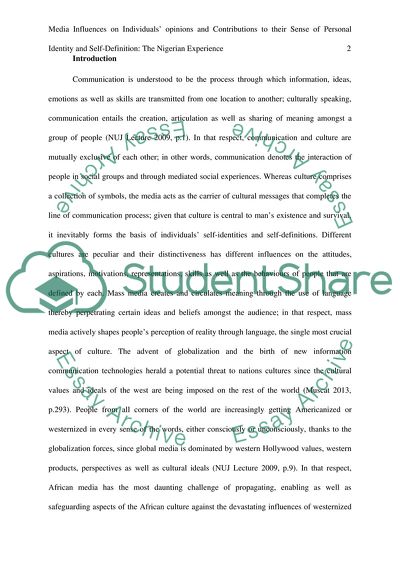Cite this document
(Media Influence on Individuals Sense of Personal Identity - Nigerian Experience Case Study Example | Topics and Well Written Essays - 4000 words, n.d.)
Media Influence on Individuals Sense of Personal Identity - Nigerian Experience Case Study Example | Topics and Well Written Essays - 4000 words. https://studentshare.org/media/1833713-how-far-do-the-media-influence-our-opinions-and-contribute-to-our-own-sense-of-personal-identity-and-self-definition-use-nigeria-as-a-case-study
Media Influence on Individuals Sense of Personal Identity - Nigerian Experience Case Study Example | Topics and Well Written Essays - 4000 words. https://studentshare.org/media/1833713-how-far-do-the-media-influence-our-opinions-and-contribute-to-our-own-sense-of-personal-identity-and-self-definition-use-nigeria-as-a-case-study
(Media Influence on Individuals Sense of Personal Identity - Nigerian Experience Case Study Example | Topics and Well Written Essays - 4000 Words)
Media Influence on Individuals Sense of Personal Identity - Nigerian Experience Case Study Example | Topics and Well Written Essays - 4000 Words. https://studentshare.org/media/1833713-how-far-do-the-media-influence-our-opinions-and-contribute-to-our-own-sense-of-personal-identity-and-self-definition-use-nigeria-as-a-case-study.
Media Influence on Individuals Sense of Personal Identity - Nigerian Experience Case Study Example | Topics and Well Written Essays - 4000 Words. https://studentshare.org/media/1833713-how-far-do-the-media-influence-our-opinions-and-contribute-to-our-own-sense-of-personal-identity-and-self-definition-use-nigeria-as-a-case-study.
“Media Influence on Individuals Sense of Personal Identity - Nigerian Experience Case Study Example | Topics and Well Written Essays - 4000 Words”. https://studentshare.org/media/1833713-how-far-do-the-media-influence-our-opinions-and-contribute-to-our-own-sense-of-personal-identity-and-self-definition-use-nigeria-as-a-case-study.


